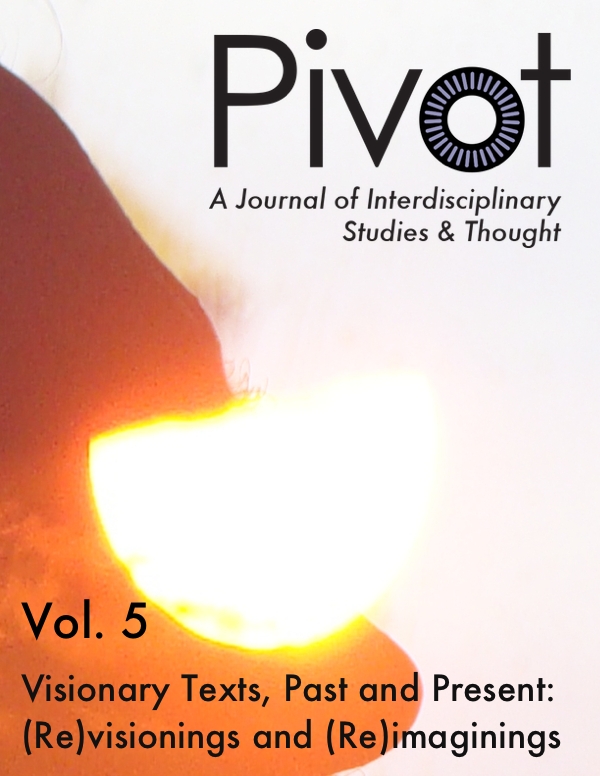Neo Boys
DOI:
https://doi.org/10.25071/2369-7326.40283Abstract
This paper considers William S. Burroughs’s nonfictional long-form essay The Electronic Revolution (1970) and contemporaneous fictional novel The Wild Boys: A Book of the Dead (1971) alongside some moments from the early work of Patti Smith, including her time with the Patti Smith Group and their four albums together between 1975 and 1979. I align Burroughs’s concepts of the word virus and wild boy – concepts subsequently taken up by Smith – with the three luxuries of nature identified by intellectual Georges Bataille in his theorization of general, or solar, economy. The parasitic and proliferative appearance of Burroughs’s writing and Smith’s performances – artworks that resemble electronic spam and speaking in tongues – bear some resemblance to the alien duplicates in Invasion of the Body Snatchers insofar as these artists waste their textual and physical bodies from within, thereby working against the sociolinguistic logic of identity.References
Anderson, Laurie. United States Live. Warner Bros., 1984. Studio album.
Astralasia23. "Patti Smith - Horses." Online video clip. YouTube. YouTube, 14 Apr. 2007. Web.
Bataille, Georges. The Accursed Share: An Essay on General Economy; Volume 1: Consumption. New York: Zone, 1988. Print.
Bataille, Georges. "The Cruel Practice of Art." Georges Bataille Electronic Library. Supervert, n.d. Web.
Bataille, Georges. Theory of Religion. New York: Zone, 1989. Print.
Berlant, Lauren. Cruel Optimism. Durham: Duke UP, 2011. Print. https://doi.org/10.1215/9780822394716
Bersani, Leo. "Is the Rectum a Grave?" October 43 (1987): 197-222. Print. https://doi.org/10.2307/3397574
Burroughs, William S. "The Art of Fiction." Interview with Conrad Knickerbocker. 1965. The Paris Review. The Paris Review, n.d. Web.
Burroughs, William S. The Electronic Revolution. Ubu, 2005. Print.
Burroughs, William S. The Wild Boys: A Book of the Dead. New York: Grove, 1971. Print.
Chun, Wendy. Programmed Visions: Software and Memory. Cambridge: MIT P, 2011. Print. https://doi.org/10.7551/mitpress/9780262015424.001.0001
Deleuze, Gilles. Negotiations, 1972-1990. New York: Columbia UP, 1995. Print.
Eshun, Kodwo. Dan Graham: Rock My Religion. London: Afterall, 2012. Print.
Fisher, Mark. "Why Burroughs Is a Cold Rationalist." Blog post. kpunk. Abstract Dynamics, 29 Aug. 2004. Web.
Grosz, Elizabeth. Becoming Undone: Darwinian Reflections on Life, Politics, and Art. Durham: Duke UP, 2011. Print. https://doi.org/10.1215/9780822394433
Hansen, Mark. "Internal Resonance, or Three Steps Towards a Non- Viral Becoming." Culture Machine 3 (2001): n.pag. Web.
Hine, Phil. "Zimbu Xototl Time." Ashé Journal 2.3 (2003): n.pag. Web.
Land, Nick. Fanged Noumena: Collected Writings, 1987-2007. Falmouth: Urbanomic, 2011. Print.
Latour, Bruno. Reassembling the Social: An Introduction to Actor-Network Theory. Oxford: Oxford UP, 2005. Print.
McLuhan, Marshall. Interview with Eric Norden. 1969. Next Nature Network. Next Nature Network, 24 Dec. 2009. Web.
Morton, Timothy. "Anti-STEM Death Ray." Blog post. Ecology without Nature. Blogger, 5 Oct. 2015. Web.
Murphy, Timothy. Wising Up the Marks: The Amodern William Burroughs. Berkeley: U of California P, 1997. Print.
Nietzsche, Friedrich. The Will to Power. New York: Vintage, 1967. Print.
Review of The Wild Boys. 1 July 1971. Kirkus Reviews. Kirkus Media, 19 Sept. 2011. Web.
Scherer, Kevin. "Patti Smith - Feedback and Poetry." Online video clip. YouTube. YouTube, 26 May 2007. Web.
Shaviro, Steven. Connected, or What It Means to Live in the Network Society. Minneapolis: U of Minnesota P, 2003. Print.
Shaviro, Steven. "They Don't Like Spam." Blog post. The Pinocchio Theory. WordPress, 30 May 2014. Web.
Smith, Patti. "Hey Joe/Piss Factory." Mer, 1974. Vinyl recording.
Smith, Patti. "Land: Horses / Land of a Thousand Dances / La Mer(de)." Horses. Arista, 1975. Studio album.
Smith, Patti. "Babelogue." Easter. Arista, 1978. Studio album.
Smith, Patti. Just Kids. New York: HarperCollins, 2010.
Teeuwen, Dave. "William S. Burroughs' 'Abstracts.'" Reality Studio. Supervert, n.d. Web.

